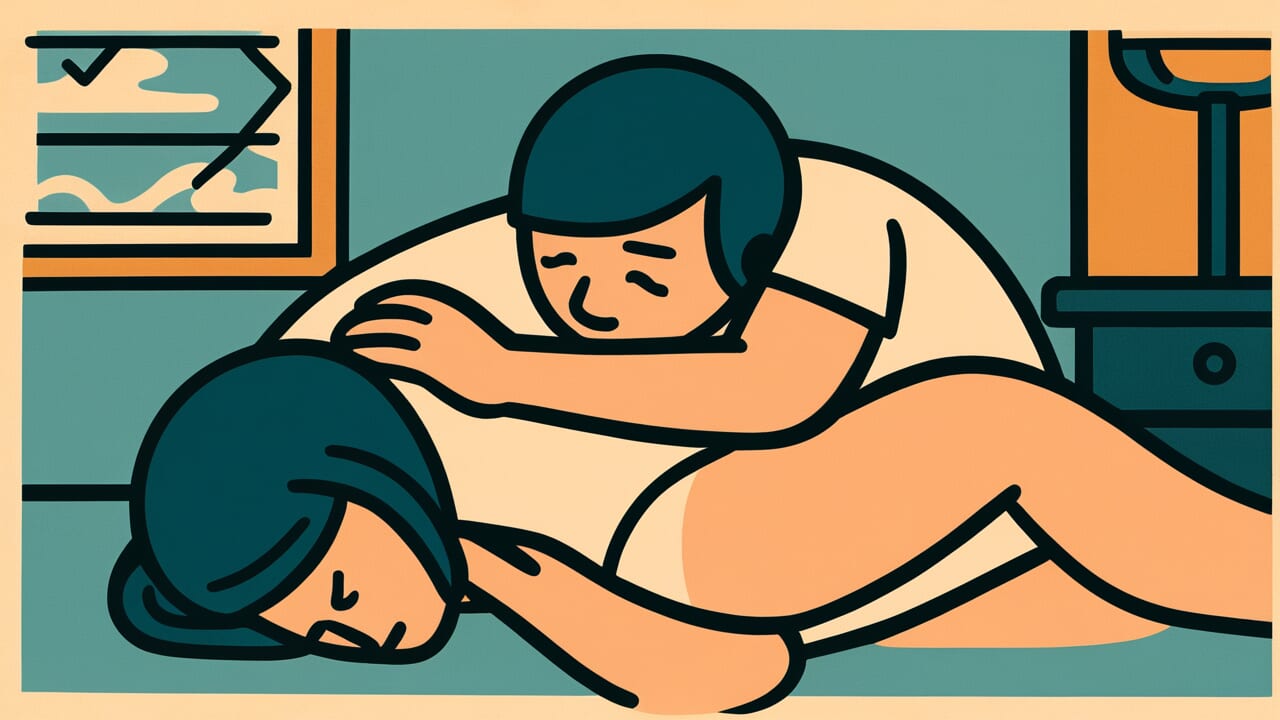How to Read “Lap pillow and hand on cheek”
Hizamakura ni hoozue
Meaning of “Lap pillow and hand on cheek”
“Lap pillow and hand on cheek” shows the huge difference between resting on a beautiful person’s lap and sitting alone with your hand on your cheek.
The proverb has come to describe a carefree and enjoyable situation in life.
This proverb shows that the same act of “resting” can be completely different depending on your situation. Spending happy time with someone is nothing like sitting alone lost in thought.
The blissful situation of relaxing on a beautiful person’s lap represents the most carefree and happy circumstances in life.
Today, people often use this proverb to describe someone in a fortunate situation. When you say “that person lives in lap pillow and hand on cheek circumstances,” you mean they live comfortably without any worries.
The proverb describes someone who enjoys life at ease, compared to those struggling with work or relationships.
Origin and Etymology
No clear written record shows when this proverb first appeared. However, the structure of the phrase offers interesting insights.
The expression contrasts two actions: “lap pillow” and “hand on cheek.” These represent opposite types of human rest.
A lap pillow means lying down with someone’s lap as your pillow. If you can rest on a beautiful person’s lap, it means a blissful moment.
On the other hand, resting your hand on your cheek shows someone alone, lost in thought. Both involve “resting,” but one includes warm human contact while the other shows loneliness.
This proverb likely emerged from common people’s culture during the Edo period. Men probably used it in pleasure quarters or at drinking parties.
They would contrast their ideal circumstances with their real situations. The proverb compared the ideal situation of a beautiful person’s lap pillow with the lonely reality of sitting alone with hand on cheek.
This expressed the gap between life’s joys and sorrows. The phrase has a light, playful sound. It let people talk about life’s ups and downs with humor.
This quality likely helped it spread among the people.
Usage Examples
- After retirement, he lives on his pension in complete comfort—truly a lap pillow and hand on cheek lifestyle
- He lives off his parents’ inheritance, so it’s lap pillow and hand on cheek for him—every day is like Sunday
Universal Wisdom
“Lap pillow and hand on cheek” asks us a fundamental question: what does “comfort” really mean for humans?
This proverb isn’t just about material wealth. It teaches us what people truly seek by showing the difference between warm human contact and lonely solitude.
What’s interesting is how the proverb describes “enjoyable circumstances” by bringing up human relationships. No matter how materially comfortable you are, sitting alone with your hand on your cheek feels lonely.
Meanwhile, the image of a beautiful person’s lap pillow contains the deep satisfaction that comes from intimate human relationships.
Humans are social creatures. No matter how many convenient tools surround us, we can’t find true happiness without warm contact with people we trust.
This proverb has been passed down for hundreds of years. This happened because our ancestors deeply understood something important.
They knew that human happiness comes more from warm relationships than from material wealth. Times change, but people cannot live alone.
This proverb continues to convey that universal truth through its playful expression.
When AI Hears This
The neck muscles of someone receiving a lap pillow normally work constantly to support the head’s weight (about 5 kilograms). This burns about 20 kilocalories of energy per hour.
When you receive a lap pillow, this burden becomes zero and energy consumption stops.
Meanwhile, the thigh muscles of the person giving the lap pillow enter a state called isometric contraction. The muscles produce force without moving.
This actually tires you out more than regular movement.
From a physics perspective, there’s an interesting asymmetry here. The person receiving the lap pillow saves about 20 kilocalories of energy.
But the person giving the lap pillow uses more energy than that. Not just the thighs, but also the lower back and back muscles keep making tiny adjustments to maintain the still posture.
In other words, transferring comfort always creates energy loss.
This is the second law of thermodynamics itself. Maintaining an orderly state where you provide comfort to someone requires more energy from the whole system.
The ultimate relaxed state of lap pillow and hand on cheek is actually a luxury that exists only because someone pays an invisible cost.
This physical law represents the essence of human relationships.
Lessons for Today
This proverb teaches you an answer to the question: what is true abundance? We spend our days busy chasing careers, income, and social status.
But stop and think. No matter how successful you become, won’t your heart feel empty if your days are lonely, like sitting alone with your hand on your cheek?
In modern society, more people feel deep loneliness even while having many “connections” on social media. This proverb teaches the importance of relationships where you can truly relax, not just surface connections.
Intimacy like a lap pillow—deep bonds with people you can open your heart to—is what truly enriches life.
Do you have relationships in your life where you can truly relax? Success at work matters, but equally important—or even more so—is cherishing warm time with people you trust.
Carefree and enjoyable circumstances might simply mean being with someone you can open your heart to, even if you have nothing else.
Nurturing such relationships is the path to a truly abundant life.



Comments